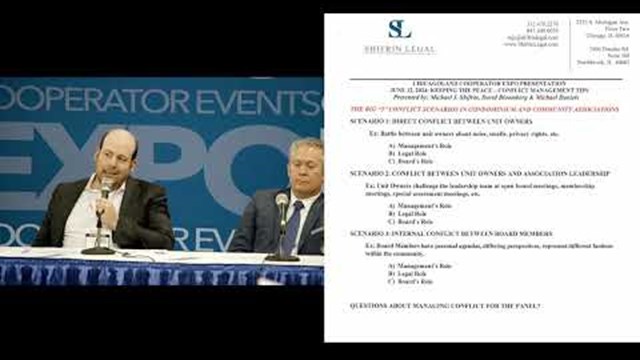Within any community, there will be disagreements. In shared interest communities, unfortunately those disagreements can sometimes lead to litigation. That litigation can take many forms: shareholder or owner vs. co-op or condominium, or vice versa. Conflict may also arise between an association or co-op and one of its vendors, or its vendors against the community. None are good and all are to be avoided if possible. Unfortunately, in the life-cycle of any co-op, condo or HOA, litigation is a likely occurrence. Knowing how to handle that litigation is critical to the health and well-being of the community.
Reality & Response
Litigation, says Mark Hakim, a partner at Schwartz Sladkus Greenberg Reich Atlas, a law firm located in New York City, “is a certainty in life, like death and taxes. While regrettable and often avoidable, litigation at a cooperative or condominium building is almost inevitable—it’s a fact that all boards and management companies must contend with, and be prepared to address. It doesn’t matter if they are being sued, or are the ones suing; often many of the same considerations must be attended to.”
Because the stakes are so high, it’s incumbent upon boards and managers to take any litigation very seriously, and have protocols in place for when it happens. Upon notice of a lawsuit, boards should immediately engage their community’s legal counsel and insurance carrier. Beyond that, the pros agree that maintaining confidentiality regarding the issue is key.
According to Michael Kim, an attorney with Chicago-based law firm Schoenberg Finkel Beederman Bell Glazer, communities should consider two basic principles as paramount in these situations: “First, protect confidential information, like strategy, concerns, litigation budgets, flaws and weakness of the association’s position, and expectations of settlement or trial results. Second, share all non-private, non-confidential information with residents in lay language, manage realistic expectations, and be candid about the negative effects of the litigation—even if it’s frivolous—on the owners and the association.”
Rules to Live By
The truth is, most co-op and condo boards are not composed of attorneys. Even if a community has an attorney or other legal professional on the board or living in the building, they’re not going to be the one to prosecute a suit for the association or corporation. That’s why every community has outside legal counsel to help the board and board members stay in the right lane while getting the job done.
“I tell board members not to discuss litigation with anyone,” says Seth Barnett, a partner with Marcus, Errico, Emmer & Brooks, a law firm located in Braintree, Massachusetts. “We direct property managers in the same fashion. However, managers know that litigation shouldn’t be discussed openly, so they try to control it from the start of the process, including among board members. In a self-managed property, more information will of course go directly to board members than in a property with third-party management. Self-managed boards must be ever more diligent to protect confidentiality”
Michael S. Simone, principal of The Simone Law Firm in Cinnaminson, New Jersey adds that “boards need to distinguish what potential litigation is involved. Specifically, if it has to do with their liability coverage. If it does, notify your insurance carrier first and foremost. Problems arise when a board tries to handle litigation or claims by themselves. That runs the risk of their carrier denying the claim. That’s how insurance companies weasel their way out; there is a required notification period in the policy, and you’re giving them an escape clause if they are not notified [of litigation] in a timely manner.”
When & How Insurance Kicks In
Depending on the type of suit, the co-op or condominium may be covered by their insurance carrier for conducting, prosecuting, or defending the case. This could extend to anything from a ‘slip-and-fall’ incident under general liability insurance coverage to defending board members under a directors and officers (D&O) policy. In these cases, the responsibility for the suit—along with the legal costs—will shift to the carrier’s attorneys, along with the legal costs.
Your association’s attorney, insurance carrier, and the attorney appointed by that insurance carrier must be involved from the start, and should be furnished with all relevant information in order to do their jobs properly. Your manager or management company (if you have one) may also be involved to provide necessary information to the attorneys during the discovery process. (Discovery is part of the legal process where pre-trial meetings are arranged between the respective parties’ legal council to establish the facts of the case.) If the lawsuit is covered under your policy, the insurance carrier will take over the case and keep you informed through your attorney as it progresses.
A word of caution: Kim warns that if a community has too many instances of litigation, or too many in too short a time period, their insurer may deem them ‘high-risk’, possibly resulting in higher premiums, or even having their policy dropped altogether. “Especially in tight market conditions, premiums may increase substantially,” he notes, “or the policy may not be renewed. Both the number of claims as well as the nature and dollar amount of claims would be considered. Some insurers will say—unrealistic and unfair as it sounds—that any claim is too many.”
“I want all boards to avoid litigation,” says Barnett. “We advise them to avoid it. When legal issues or challenges come up, I want them to contact me immediately.” When it comes to managed versus self-managed associations, Barnett notes that “there’s no more resistance to contacting us when a suit is threatened in managed properties than in self-managed properties. In fact, self-managed boards are generally more receptive to hearing their legal counsel’s opinions.”
Effect on Sales & Reputation
What about longer term impacts of litigation on things like sales prices and community reputation? During the purchasing process, buyers will find out if a community has a reputation for litigiousness, and what it can cost shareholders or owners.
“Buildings with a long history of litigation, or frequent litigation, often develop a reputation that leads brokers to avoid showing apartments in those very buildings,” says Hakim, “and that’s quite understandable. Generally, unless a buyer is getting a steep discount, most would wish to stay away from buildings with frequent lawsuits.”
And prospective buyers will find out if your community is prone to legal snarls; whether a community is a condo, co-op, or HOA, during the purchasing process, the board or management company will have to complete a questionnaire from the buyers’ counsel—and very often their lender as well—that includes questions about any litigation the association or corporation is involved in, either currently or recently. If that answer is yes, many buyers may opt to pass on buying into that community out of concern about special assessments to pay for a judgment, the board being preoccupied and less able to govern, and just the sheer acrimony and bad vibes that come with ongoing legal actions.
However, the pros note that not all lawsuits are equal in the eyes of a potential purchaser. Suits alleging theft, impropriety, bad faith, or other malfeasance by the board or management will have a very different—and more damaging—reputational impact on the building and property values within it than “A one-off slip and fall that’s being handled by insurance,” says Hakim. “The latter should certainly not have the same impact as misbehavior by board members.”
Unfortunately, there is no black-and-white rule in terms of exactly what litigation a buyer’s attorney will ding as a major problem, versus a minor hassle. “They would be looking at the nature and types of lawsuits,” Hakim continues, “as well as the frequency, whether insurance has covered them, and what the impact is on the building or association’s insurance premiums.”
Litigation is unfortunately a fact of life for virtually all common interest communities, whether co-op, condo, or HOA. When your community’s number comes up, it’s imperative that the board act quickly and with a clear vision to respond. Notify your counsel immediately; do the same with your insurance carrier. Delay in facing the proverbial music can be both costly and fateful. Board members must also always keep in mind that what information they are privy to as leaders in the community should always be kept confidential so as not to compromise future proceedings. Lawsuits are not a casual matter, so having a formalized protocol to follow when the inevitable happens will go a long way in reaching positive outcomes.
A.J. Sidransky is a staff writer/reporter for CooperatorNews, and a published novelist. He may be reached at alan@yrinc.com.










Leave a Comment